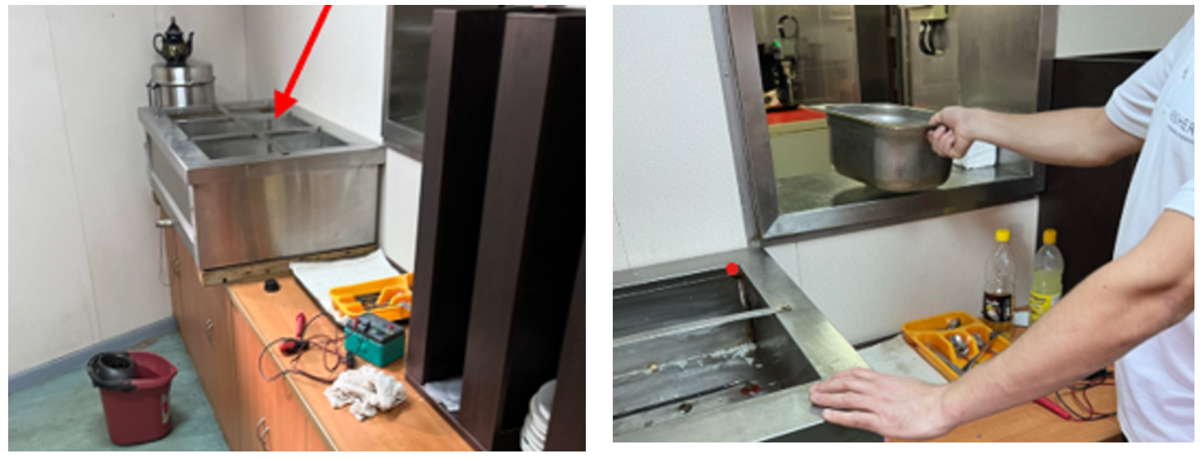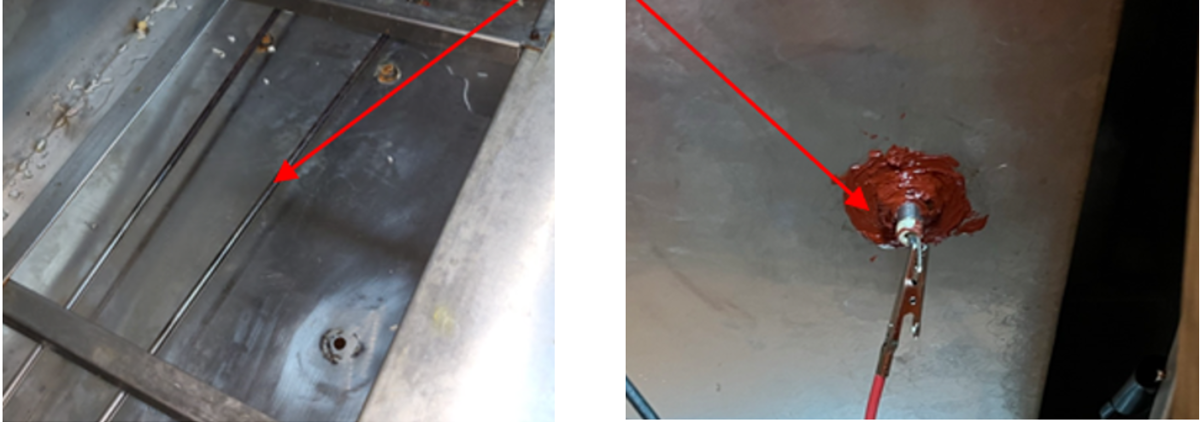Electrocution incident – make sure electrical equipment is safe!
- Safety Flash
- Published on 3 August 2023
- Generated on 10 February 2026
- IMCA SF 19/23
- 2 minute read
Jump to:
A vessel cook received a mains electric shock when he simultaneously touched a metal bain-marie AND the messroom service window with both of his hands.
What happened?
A vessel cook received a mains electric shock when he simultaneously touched a metal bain-marie (the metal electrically heated serving containers commonly used in messrooms) AND the messroom service window with both of his hands.
The cook received first aid onboard; the incident was classified as a high potential near miss.

Bain-marie in galley, and position of cook’s hands when shock was received

Showing earth fault of the electrical heating element
What was the cause?
- There was a an earth fault in the electric heater element of the bain-marie due to a detached earthing wire.
- There had been no recent testing or maintenance of the galley electrical system.
Additionally it was found that:
- There was no planned maintenance schedule for inspection of galley equipment.
- Onboard Risk Assessment for use of portable and other electrical equipment did not include Portable Appliance Testing (PAT ) of galley electrical equipment.
Actions?
- Thorough inspection for and removal of, any damaged or deteriorated electrical equipment.
- Arranged unscheduled testing of all stationary and portable electrical equipment on board vessels fleetwide.
- Added galley electrical equipment inspection and maintenance to planned maintenance system.
- Updated Onboard Risk Assessment for use of portable and other electrical equipment on board to include equipment in the galley and the mess.
Mains electrical safety may be more easily overlooked in areas such as the galley, the mess, the accommodation and on the bridge. The risks involved in improperly maintained electrical equipment are further illustrated in this news story here from 2014 in which a young person was killed in her home: insulation around a mains extension cable had become worn, and a live wire was exposed, causing her death by electrocution.
Members may wish to refer to:
- Short video: Electrical hazards
Related Safety Flashes
-
IMCA SF 24/21
31 August 2021
-
-
IMCA SF 10/21
8 April 2021
-
-
IMCA SF 25/20
25 August 2020
-
-
IMCA SF 19/19
12 August 2019
-
-
IMCA SF 13/19
4 June 2019
-
-
IMCA SF 24/18
30 October 2018
-
-
IMCA SF 05/13
4 April 2013
IMCA Safety Flashes summarise key safety matters and incidents, allowing lessons to be more easily learnt for the benefit of the entire offshore industry.
The effectiveness of the IMCA Safety Flash system depends on the industry sharing information and so avoiding repeat incidents. Incidents are classified according to IOGP's Life Saving Rules.
All information is anonymised or sanitised, as appropriate, and warnings for graphic content included where possible.
IMCA makes every effort to ensure both the accuracy and reliability of the information shared, but is not be liable for any guidance and/or recommendation and/or statement herein contained.
The information contained in this document does not fulfil or replace any individual's or Member's legal, regulatory or other duties or obligations in respect of their operations. Individuals and Members remain solely responsible for the safe, lawful and proper conduct of their operations.
Share your safety incidents with IMCA online. Sign-up to receive Safety Flashes straight to your email.